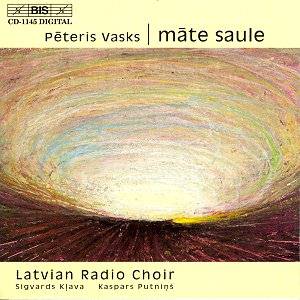Vasks'
three Milosz poems are set in English translation
with much phrasal repetition. They are complex, tuneful and full
of resourceful use of modernistic vocal techniques often employing
melisma. It is only in the final song, the nostalgic and wondering
Encounter, that the textures simplify and the writing glows
with tenderness (like Stanford's Bluebird). That last song
is a gem of a setting which ends with some of the finest softly
sung stratospheric singing - weaving and interleaving. The work
was written for the Hilliard Singers who premiered it in London
in 1995. Paul Hilliard, I am pleased to say, continues his support
of Vasks.
Similar
effects, touching on the complexity of Penderecki's complex choral
writing, appear in the 1988 Zemgale. The title is
the name of the affluent region of Latvia that has borne the brunt
of invaders' oppressions, pogroms and deportations over the centuries.
The melodic line is always preserved and overall the writing is
not that extreme only fitfully entering a distinctly chillier
Ligeti-like world (tr. 4 5.10, 11.32). Several parts of this work
go much further down the avant-garde route than anything in the
Milosz Poems.
Māte
saule (Mother Sun) and Madrigāls date
from his student years. They are brief pieces which oscillate
between Tormis-like folk-simplicity and the avant-garde tendencies
of Zemgale.
Litene
is a ballad for twelve-voice choir to a text by Uldis
Bērzinš. Litene is a Latvian village, the scene of the
arrest and execution and in some cases deportation to Siberia
of hundreds of officers from the Latvian army. Aleatoric effects
are introduced as well as the swelling and receding vocal 'focus-slides'
that characterise some of the writing of Penderecki and Hovhaness.
This joins a generation of war-grieving works such as Martinů's
and Alan Bush's Lidice works, Frankel's Violin Concerto,
Schoenberg's Survivor of Warsaw and Penderecki's Hiroshima
Threnody.
Dona
Nobis Pacem is here given in its version with organ rather
than with chamber orchestra (you can hear the latter on Harmonia Mundi HMU
907311). It is a work that rediscovers simplicity of utterance
and with much unison writing links in varying degrees with works
by Kreek and Tormis. It has a strong spiritual grace that rises
to nobility (5.03) and majesty (8.43) and does so through the
repeated setting, over approaching a quarter of an hour, of the
words of the title; nothing more. If you like Tavener then you
must hear this.
Sincerity
itself is not enough and Vasks sincerity is never in doubt. Not
a specious moment or a miscalculated gesture will you find in
his music. It is meditative, never dull, full of a steady undazzling
light and if in some of these works he explores the outerlands
of the avant-garde he keeps a firm hold on Ariadne's silken thread
back to folk melody and rhythmic life.
Rob
Barnett
